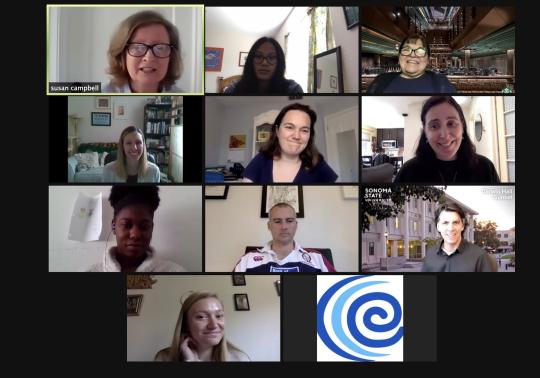Diving Deep into Reflection
“One of the things that is very important for reflecting, is having your students reflect throughout your service-learning project… they need to process their experiences in order to learn,” said Dr. Susan Campbell during the Deepening Reflection in Service-Learning workshop.
This was the second virtual faculty workshop of the year which was hosted by the CCE. The facilitators included Dr. Susan Campbell (School of Education and Faculty Fellow in the CCE) and Dr. Michael Cohen (Department of Biology and Faculty Fellow in the CCE). We were also joined by CCE faculty, AmeriCorps VISTA members, as well as Dr. Melissa Soenke (Associate Professor in Psychology at CSU Channel Islands). This workshop focused on how crucial reflection is in a service-learning class.
The faculty at this workshop explored different ways on how they could approach reflection in service-learning, as well as figure out how to deepen their students’ reflections. There are many reflection techniques, but a few that we covered were ABC method and What? So What? Now What? method, which is a process for students to reflect on the projects they are doing, on a deeper level. This can be done through writing assignments, art projects like sculptures, or presentations. This workshop allowed faculty members to brainstorm and bounce ideas off of one another. By doing this, faculty are able to share and learn from their peers.
In the second half of the workshop, Dr. Michael Cohen explained how much of an impact reflection has on students by sharing research about different ways to conduct reflection. “Science courses that have community engagement aspects to them naturally blend themselves as a reflection… it’s built in when a student is doing a project (applied science) you're keeping a lab notebook...the reflection can be built into the notes that people are taking as of something that they do at the end of the day to see how they... write how they progress through the goals of the project...At the very end, the terminal report… there’s a good opportunity for them to reflect on the whole term,” said Dr. Cohen. He then emphasizes that reflections have a much deeper meaning than most students think. He discussed different ways faculty could deepen their reflections by asking “How does the community engagement project fit with your academic goals for the course?,” “How did it enhance academic learning?,” and “How does it serve the community partner and how could that be improved?”
When asked to share their reflection experiences, Dr. Soenke, who also works closely with CCE of CSU Channel Islands said that “it’s been nice because I feel like I haven’t had to go through the learning myself, I’ve kind of gotten the tips on the best practices from them and I used some of their recommended prompts and I do five reflections that are written throughout the semester… My students usually work with their community partners, it’s a stress and coping class, so reduce stress and they choose their partners so that’s kind of nice that they’re usually in small groups with the partner but they have some choice in what type of organization they work with. A lot of our students are part of the communities they are going to work in and that’s nice as well.”
Overall, I thought this faculty workshop was the most interesting one so far. I really enjoyed listening to how faculty come up with different ways to have their students reflect on projects. As a student, I have yet to take a class where service-learning is taught, but I agree that reflection is really important, as it benefits both students and faculty.

Author: Kiera Moran



